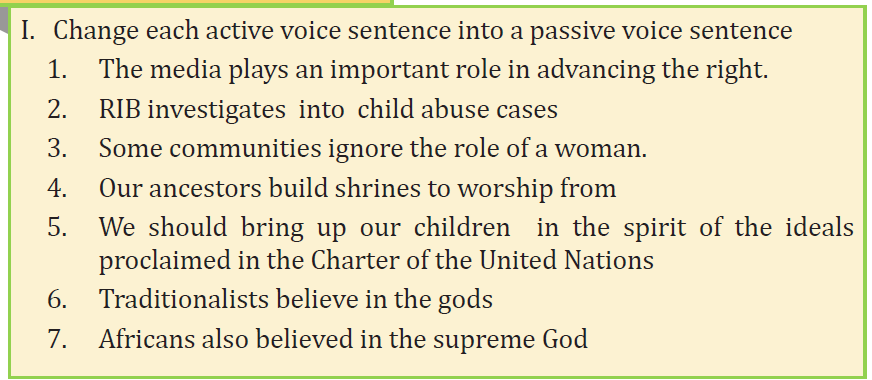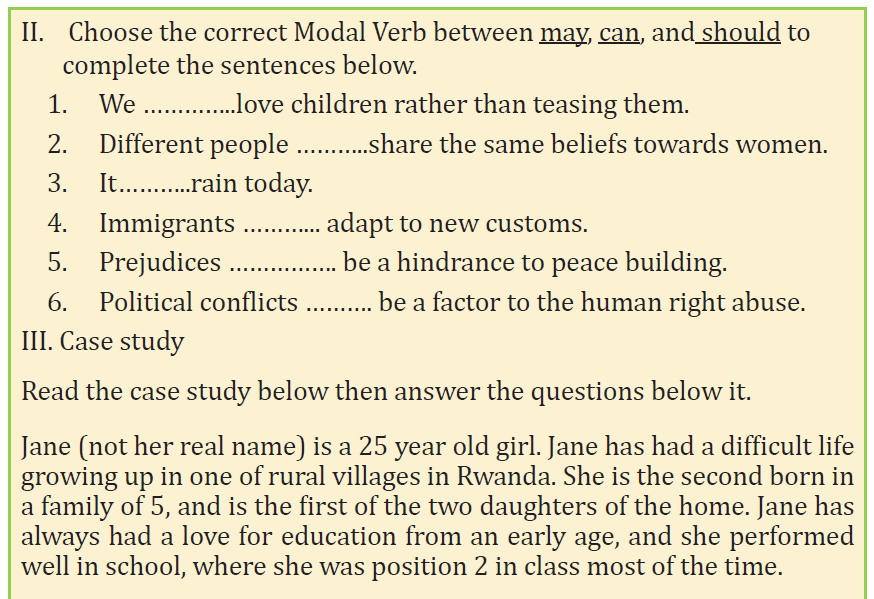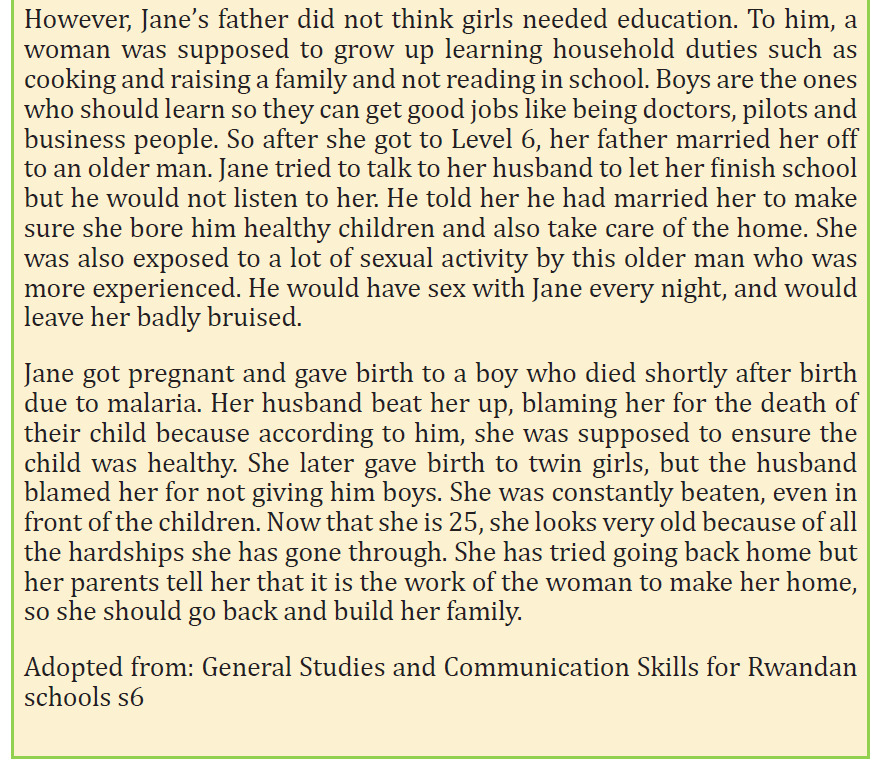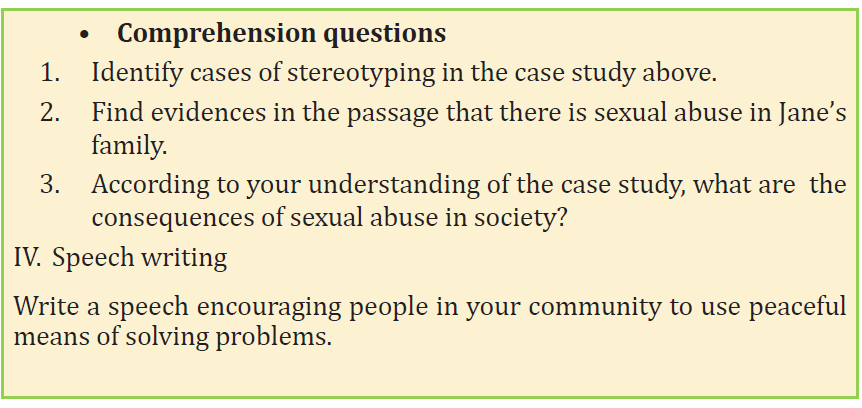UNIT 7HUMAN RIGHTS AND ETHICS
Key Unit Competence: To use language learnt in the context of Human rightsand Ethics
7.1. Describing rights
7.1.1. LEARNING ACTIVITY
Reading and exploitation of the textsRead the following passages and carry out the following tasks
• Text 1. I am the first accused
Government policy, violence by the African people had become inevitable, and
that unless responsible leadership was given to canalize and control the feelings
of our people, there would be outbreaks of terrorism which would produce an
intensity of bitterness and hostility between the various races of this country
which is not produced even by war. Secondly, we felt that without violence there
would be no way open to the African people to succeed in their struggle against
the principle of white supremacy. All lawful modes of expressing opposition to
this principle had been closed by legislation, and we were placed in a position
in which we had either to accept a permanent state of inferiority, or to defy the
Government. We chose to defy the law. We first broke the law in a way which
avoided any recourse to violence; when this form was legislated against, and
then the Government resorted to a show of force to crush opposition to its
policies, only then did we decide to answer violence with violence.
But the violence which we chose to adopt was not terrorism. We who formed
Umkhonto were all members of the African National Congress, and had behind
us the ANC tradition of non-violence and negotiation as a means of solving
political disputes. We believe that South Africa belongs to all the people
who live in it, and not to one group, be it black or white. We did not want an
interracial war, and tried to avoid it to the last minute. If the Court is in doubt
about this, it will be seen that the whole history of our organization bears out
what I have said, and what I will subsequently say, when I describe the tactics
which Umkhonto decided to adopt. I want, therefore, to say something about
the African National Congress.
The African National Congress was formed in 1912 to defend the rights of the
African people which had been seriously curtailed by the South Africa Act, and
which were then being threatened by the Native Land Act. For thirty-seven years
- that is until 1949 - it adhered strictly to a constitutional struggle. It put forward
demands and resolutions; it sent delegations to the Government in the belief
that African grievances could be settled through peaceful discussion and that
Africans could advance gradually to full political rights. But White Governments
remained unmoved, and the rights of Africans became less instead of becoming
greater. In the words of my leader, Chief Lutuli, who became President of the
ANC in 1952, and who was later awarded the Nobel Peace Prize:100 100
“Who will deny that thirty years of my life have been spent knocking in vain,
patiently, moderately, and modestly at a closed and barred door? What have
been the fruits of moderation? The past thirty years have seen the greatest
number of laws restricting our rights and progress, until today we have reached
a stage where we have almost no rights at all.”
Even after 1949, the ANC remained determined to avoid violence. At this time,
however, there was a change from the strictly constitutional means of protest
which had been employed in the past. The change was embodied in a decision
which was taken to protest against apartheid legislation by peaceful, but
unlawful, demonstrations against certain laws. Pursuant to this policy the ANC
launched the Defiance Campaign, in which I was placed in charge of volunteers.
This campaign was based on the principles of passive resistance. More than
8,500 people defied apartheid laws and went to jail. Yet there was not a single
instance of violence in the course of this campaign on the part of any defiance.
I and nineteen colleagues were convicted for the role which we played in
organizing the campaign, but our sentences were suspended mainly because
the Judge found that discipline and non-violence had been stressed throughout.Extract from Nelson Mandela’s speech “ I am the first accused”
• Comprehension questions
1. Explain the extent to which Mandela was a civil right activist in the first
paragraph.
2. Discuss the positive deeds of ANC during the civil right struggle
3. What, according to the passage, shows that ANC’s struggle was peaceful?
4. What really makes Nelson Mandela a civil right hero in the last paragraph?
5. Which disappointment did ANC members face in the fight for their full
political rights?
6. South Africa belongs to all the people who live in it, and not to one group,be it black or white. Justify this statement in not more than 15 lines
• Text 2: Right to media
Several international organizations have recognized the fundamental Human
Right to access information held by public organs and private bodies. These
include the United Nations, the African Union and the Commonwealth. In 1980,
the Commonwealth recognized the fact that; ‘Public participation in the democratic
and government processes was at its most significant when citizens had
adequate access to information’. Similarly, the African Union has also upheld
the right of every individual to access information.
All citizens, therefore, have a right to know. Realization of the right to know
cannot take place without a free, independent, ethical and professional media.
The media plays an important role in advancing the right to know. The secrecy
and withholding of information by the government and private firms corrodes
democracy, facilitates corruption and undermines public policy making.
Individuals working on a building and construction site or in an industry have
the right to know of dangers they are likely to encounter as they carry out their
duties. This enables them to take precautions for their own safety. This also
applies to people who live near factories, mining sites or industries. They need
access to information regarding the environment they live in and dangers they
may be predisposed to, depending on their location. Processed products, chemicals,
pharmaceutical drugs, machinery and electronics should be labelled with
information that guides users on their usage, dangers and methods of operating
and how such items can be disposed of. Such information is critical to
people; therefore, individuals have a right to know. The Constitution of Rwanda
grants citizens the right to know.
Extract from General Studies and Communication Skills for Rwandan schools,Student Book Senior 4(REB)
• Discuss and answer the following questions.
1. Explain how the media in Rwanda has promoted the right to know in the
country.
2. Analyze the importance of the right to know and access to information.
3. Draw health hazard symbols found in buildings, construction sites orproduct labels and give their meanings


7.2. Describing children’s Rights
7.2.1. LEARNING ACTIVITY
Reading and text analysis
Read the following extract and answer the questions that follow• Text: Children’s rights
Parents, communities, and governments need to learn how to set goals for
children, create a positive discipline and create a conducive home climate for
children, understand how children think and feel and learn how they can be
problem solvers in challenging situations.
Children have the right to be protected from abuse, neglect and other
mistreatment in homes. They should have the right to adequate food, clothing
and shelter, regular medical and health services, educational, permanent homes.
They shouldn’t be discriminated and forced into labour. The UN convention has
provided a detailed list on the rights of children. They include the following:
Article 1: Everyone under 18 years of age has all the right in this convention.
Article 2: The convention applies to everyone whatever their race, religion,
abilities, whatever they think or say, whatever type of family they
come from.
Article 3: All organizations concerned with children should work towards what
is best for each child.
Article 4: Government should make these right available to children.
Article 5: Government should respect the rights and responsibilities of family
to guide their children so that, as they grow up, they learn to use their
rights properly.
Article 6: Children have the right to live a full life. Government should ensure
that children survive and develop healthily.
Article 7: Children have the right to a legally registered name and nationality.
Children also have the right to know their parents, as far as possible,
to be cared for by them.
Article 8: Government should respect a child’s right to a name, nationality and
family ties.
Article 9: Children should not be separated from their parents, unless it is for
their own good, for example, if a parent is mistreating or neglecting a
child. Children whose parents have separated have the right to stay in
contact with both parents, unless this may harm the child.
Article 10: Families who live in different countries should be allowed to move
between those countries so that parents and children can stay in
contact or get back together as family.
Article 11: Government should take steps to stop children being taken out of
their own country illegally.
Article 12: Children have the right to say what they think should happen
when adults are making decision that affect them and to have their
opinions taken into account.
Article 13: Children have the right to get and share information, if the information
is not damaging to them or to others.
Article 14: Children have the right to think and believe what they want and
to practice their religion, if they are not stopping other people
from enjoying their rights. Parents should guide children on these
matters.
Article 15: Children have the right to meet with other children and young people
and join groups and organizations, as long as this cannot stop other
people from enjoying their rights
Article 16: Children have the right to privacy; the law should protect them from
attacks against their way of life, their good name, their family and their home.
Article 17: Children have the right to reliable information from the media.
Article 18: Both parents share responsibility for bringing up their children and
should always consider what is best for each child. Governments
should help parents by providing services to support them, especially
if both parents work.
Article 19: Government should ensure that children are properly cared for and
protect them from violence, abuse and neglect by their parents, or
anyone else who looks after them.
Article 20: Children who cannot be looked after by their own family must be
looked after properly by people who respect their religion, culture
and language.
Article 21: When children are adopted the first concern must be what is best for
them. The same rules should apply whether children are adopted
in the country of their birth or if they are taken to live in another
country.
Article 22: Children who come into country as refugees should have the same
rights as children who are born in that country.
Article 23: Children who have any kind of disability should receive special care
and support so that they can live a full and independent life.
Article 24: Children have the right to good quality health care, clean water,
nutritious food and a clean environment so that they will stay
healthy. Richer countries should help poorer countries achieve this.
Article 25: Children who are looked after by their local authorities rather than
their parents should have their situation reviewed regularly.
Article 26: The government should provide extra money for the children of
families in need.
Article 27: Children have the right to standard living that is good enough to
meet their physical and mental needs. The government should help
families who cannot afford to provide this.
Article 28: Children have a right to an education. Discipline in schools should
respect children’s human dignity. Primary education should be
free. Wealthier countries should help poorer countries achieve this.
106 106
Article 29: Education should develop each child’s personality and talents to
the full. It should encourage children to respect their parents, their
cultures and other cultures.
Article 30: Children have a right to learn and use the language and customs
of their families, whether or not these are shared by most of the
people in the country where they live, as long as this does not harm
others.
Article 31: Children have a right to relax, play and join in a wide range of leisure
activities.
Article 32: Government should protect children from work that is dangerous or
that might harm their health or education.
Article 33: Government should provide ways of protecting children from
dangerous drugs.
Article 34: Government should protect children from sexual abuse.
Article 35: Government should make sure that children are not abducted or
sold.
Article 36: Children should be protected from any activity that could harm their
development.
Article 37: Children who break the law should not be treated cruelly. They
should not be put in prison with adults and should be able to keep
in contact with their family.
Article 38: Government should not allow children under 15 to join the army.
Children in war zones should receive special protection.
Article 39: Children who have been neglected or abused should receive special
help to restore their self-respect.
Article 40: Children who are accused of breaking the law should receive legal
help. Prison sentences for children should only be used for the most
serious offences.
Article 41: If the law of a country protects children better than the articles of
the convention, then those laws should override the convention.
Article 42: Government should make the convention known to all parents and
children.
Extracted from: Legal and policy framework for children’s Rights in Rwanda byPamela Abbot and Francesca Sapsford.
• Comprehension questions :
1. What do you understand by children’s rights?
2. Basing on the short text above, describe the rights of children without
reproducing the passage.
3. Suggest possible advice to people who violate children’s rights in your
community.4. Discuss the importance of protecting children.

 • Text: The concepts of ethicsThe word ethics etymologically is from the Greek word “ ethos” which means“customs”. Ethics is defined as science of good and bad. The modern ethicssubstitutes notions of good and bad to those of morality, values and anti-value.Ethics can also be defined as the part of human reflection which searches todetermine the sense of human life, and means to come to this end. This definitionis also applied to philosophy and ethical philosophy.Ethics is the branch of philosophy. It is interested in moral and elaboratesanalysis and theories on nature, function and values of moral judgment. Thesejudgments help us to evaluate our behavior and society organization and toguide our proper actions.It treats from the value of good and bad and constitutes then life orientationand engagement for it treats from one value of good and bad and constitutesthe life orientation and engagement for wellbeing.Academically, ethics is classified among human sciences like philosophy ofwhich it is the part. The society cannot exist if the members do not respect andhelp one another at least up to a given level. By this, in all societies the samephenomenon is produced. In every society and in every country, it statues andjudges that some actions are good and have to be done, whereas others are bad,must be avoided and rejected. The ethics questions rise in moral practice.Ethics indicates the ideal to be reached. It shows the way to take and helpsto discover positive human values to be cultivated. Its fundamental task is thesuccess of human life, characterized by positive human values.Culture_ODL_Module• Comprehension questions1. What do you understand by ethics?2. In which way ethical judgments help in our day to day life?3. What do you think is the purpose of ethics?4. After reading the above passage about ethics, examine your community’sethics and present the findings to the class.
• Text: The concepts of ethicsThe word ethics etymologically is from the Greek word “ ethos” which means“customs”. Ethics is defined as science of good and bad. The modern ethicssubstitutes notions of good and bad to those of morality, values and anti-value.Ethics can also be defined as the part of human reflection which searches todetermine the sense of human life, and means to come to this end. This definitionis also applied to philosophy and ethical philosophy.Ethics is the branch of philosophy. It is interested in moral and elaboratesanalysis and theories on nature, function and values of moral judgment. Thesejudgments help us to evaluate our behavior and society organization and toguide our proper actions.It treats from the value of good and bad and constitutes then life orientationand engagement for it treats from one value of good and bad and constitutesthe life orientation and engagement for wellbeing.Academically, ethics is classified among human sciences like philosophy ofwhich it is the part. The society cannot exist if the members do not respect andhelp one another at least up to a given level. By this, in all societies the samephenomenon is produced. In every society and in every country, it statues andjudges that some actions are good and have to be done, whereas others are bad,must be avoided and rejected. The ethics questions rise in moral practice.Ethics indicates the ideal to be reached. It shows the way to take and helpsto discover positive human values to be cultivated. Its fundamental task is thesuccess of human life, characterized by positive human values.Culture_ODL_Module• Comprehension questions1. What do you understand by ethics?2. In which way ethical judgments help in our day to day life?3. What do you think is the purpose of ethics?4. After reading the above passage about ethics, examine your community’sethics and present the findings to the class.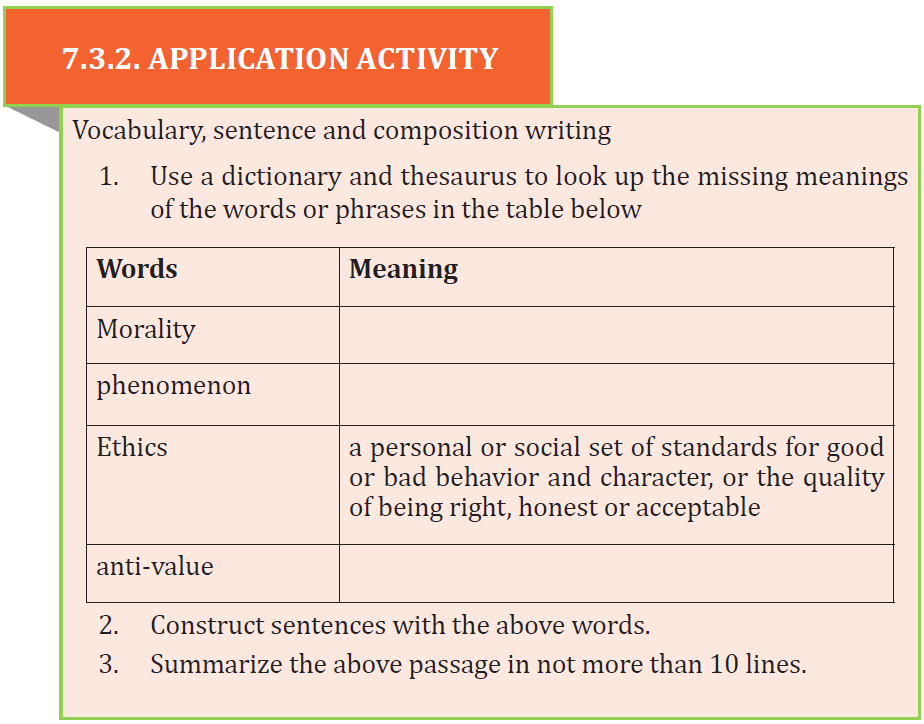
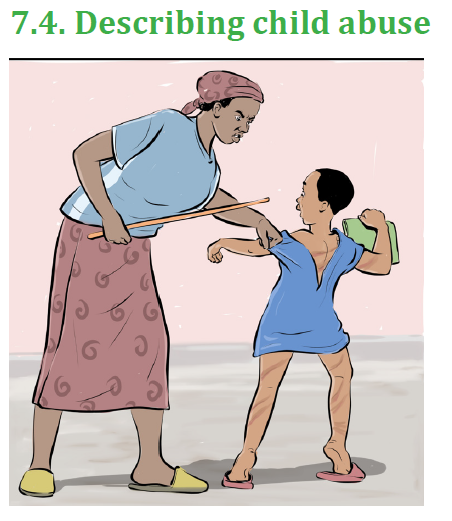 7.4.1. LEARNING ACTIVITYReading and text analysisRead the extract below and answer the questions that follow• Text. An accident happensOne day I was returning home with a heavy water gourd on my back. It hadrained very heavily the day before. I made a wrong step, slipped and staggeredbadly. I lost balance and the gourd fell down and broke into many pieces.I went home trembling with fear and explained to Mukulu what happened. Ishould have known better. Mukulu snatched the strap with which I had beencarrying the gourd and thrashed me with it heavily. I screamed, begging formercy, but she wouldn’t stop whipping me. She yelled, “is it your mother’sgourd that you have broken, you worthless creature?”Despite my pleas, she wouldn’t listen to me. Then I realized that I should runfor my life. I slipped out of her hands and ran out of the house, but she ran afterme, whipping me furiously. I was saved by some strokes of good luck when shestumbled over something and fell down heavily. She cursed me heatedly, but bythat time, I had run round the granary.That evening Mukulu didn’t give me food. I went to bed on an empty stomach. Icouldn’t sleep as my stomach rumbled in hunger. They had eaten sweet potatoesfor supper that evening.That night I felt so hungry that I thought I would starve to death. So I got upfrom my bed very quietly, fearing to wake Mukulu. I tiptoed to her bedroomdoor, pressed my ear against the door and listened. Yes, she was fast asleep,snoring soundly. So I tiptoed to the main door and opened. I went to the kitchento see whether there were any potatoes left in the pot.I walked holding my breath and my teeth clenched, fearing I would be heard.I inserted the key into the keyhole and opened the door silently. Just as I wasgetting in, I accidently stepped on a chicken in the dark and it made a lot ofnoise! I nearly fainted. I heard Mukulu’s voice calling out for Muindu, asking himto go out and see what was disturbing the chicken. I stood there too terrified toknow what to do until Muindu came out of the house running.An extract from the story “the poor child “by David G. Mailu• Comprehension questions1. Describe the mood of the speaker in the above passage2. Which child abuses have been applied to the narrator?3. What misfortune happened to the speaker when she went to the kitchento find some food?4. What would you do in the position of the narrator?5. Has anything like this ever happened to you or to someone you know? Ifyes, what was your reaction?6. What are your friends and you doing to stop the child abuse?
7.4.1. LEARNING ACTIVITYReading and text analysisRead the extract below and answer the questions that follow• Text. An accident happensOne day I was returning home with a heavy water gourd on my back. It hadrained very heavily the day before. I made a wrong step, slipped and staggeredbadly. I lost balance and the gourd fell down and broke into many pieces.I went home trembling with fear and explained to Mukulu what happened. Ishould have known better. Mukulu snatched the strap with which I had beencarrying the gourd and thrashed me with it heavily. I screamed, begging formercy, but she wouldn’t stop whipping me. She yelled, “is it your mother’sgourd that you have broken, you worthless creature?”Despite my pleas, she wouldn’t listen to me. Then I realized that I should runfor my life. I slipped out of her hands and ran out of the house, but she ran afterme, whipping me furiously. I was saved by some strokes of good luck when shestumbled over something and fell down heavily. She cursed me heatedly, but bythat time, I had run round the granary.That evening Mukulu didn’t give me food. I went to bed on an empty stomach. Icouldn’t sleep as my stomach rumbled in hunger. They had eaten sweet potatoesfor supper that evening.That night I felt so hungry that I thought I would starve to death. So I got upfrom my bed very quietly, fearing to wake Mukulu. I tiptoed to her bedroomdoor, pressed my ear against the door and listened. Yes, she was fast asleep,snoring soundly. So I tiptoed to the main door and opened. I went to the kitchento see whether there were any potatoes left in the pot.I walked holding my breath and my teeth clenched, fearing I would be heard.I inserted the key into the keyhole and opened the door silently. Just as I wasgetting in, I accidently stepped on a chicken in the dark and it made a lot ofnoise! I nearly fainted. I heard Mukulu’s voice calling out for Muindu, asking himto go out and see what was disturbing the chicken. I stood there too terrified toknow what to do until Muindu came out of the house running.An extract from the story “the poor child “by David G. Mailu• Comprehension questions1. Describe the mood of the speaker in the above passage2. Which child abuses have been applied to the narrator?3. What misfortune happened to the speaker when she went to the kitchento find some food?4. What would you do in the position of the narrator?5. Has anything like this ever happened to you or to someone you know? Ifyes, what was your reaction?6. What are your friends and you doing to stop the child abuse?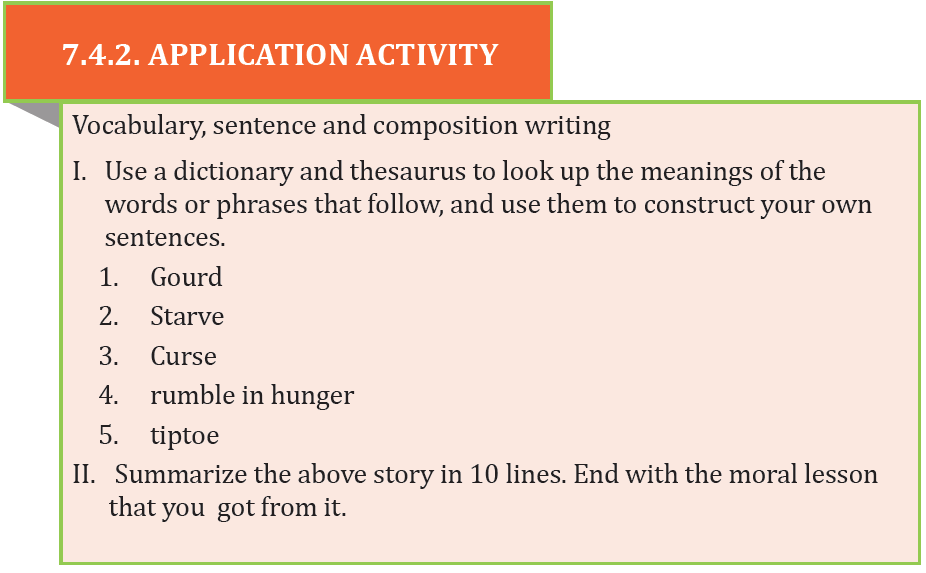 7.5. Fighting abusesPicture observation and interpretation
7.5. Fighting abusesPicture observation and interpretation
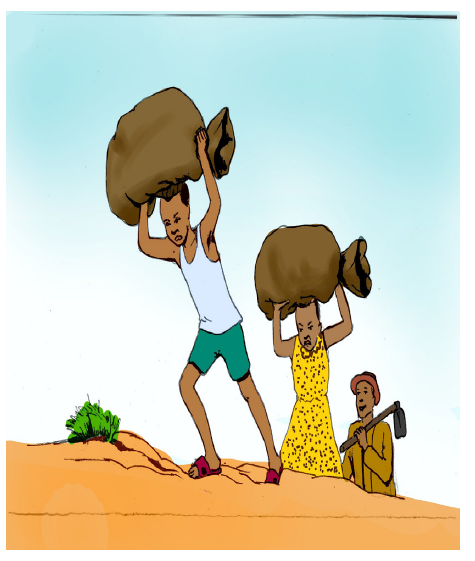 1. After observing the figure and the picture above, discuss the childprotection cycle in 150 words essay7.5.1. LEARNING ACTIVITYReading and text analysis• Text. Religious bodies urged to join fight against child abuseThe Secretary-General of Rwanda Investigation Bureau (RIB) Jeannot Ruhungaon Friday said that the campaign against child abuse is not the responsibility of acertain single institution but rather a collective effort if the vice was to be completelyuprooted in the Rwandan socTiety.He made the observation while opening a one-day conference in Kigali aimed atevaluating the progress made in the fight against GBV and what new measurescan be taken to ensure this is curtailed.“It’s a must for each and everyone who wants to make a meaningfulcontribution to the future of our nation, to take care of the young generationby shielding them from any form of abuse. Because what we sow in themtoday, is what we shall harvest in the future. The future of our country lies inthe hands of young people,” Ruhunga said.The conference, titled “Stop abusing a child” was jointly organized by RIBin partnership with World Vision.The main purpose of the meeting was to rally religious organizations, civilsociety and non-governmental organizations to join the fight against all formsof child abuse.Prof Anastase Shyaka, the Minister for Local Government pointed out theparticular importance of religious organizations in this fight.“Religious entities, which are able to reach out to a lot of people in a short time,are the right partners in advocating for children rights,” he said.Through their body, the Rwanda Interfaith Council, the religious entities vowedto support the efforts as stressed by the Mufti of Rwanda, Sheikh Salim Hitimana,who represented the council at the meeting.child-abuse by Bertrand Byishimo September 30, 2019• Comprehension questions1. What was the issue discussed in the conference?2. Why do you think child abuse is not a responsibility of certain singleinstitution?3. Discuss the message of RIB Secretary-General.4. Why do you think Religious entities are expected to be more productivein the fight against child abuse?
1. After observing the figure and the picture above, discuss the childprotection cycle in 150 words essay7.5.1. LEARNING ACTIVITYReading and text analysis• Text. Religious bodies urged to join fight against child abuseThe Secretary-General of Rwanda Investigation Bureau (RIB) Jeannot Ruhungaon Friday said that the campaign against child abuse is not the responsibility of acertain single institution but rather a collective effort if the vice was to be completelyuprooted in the Rwandan socTiety.He made the observation while opening a one-day conference in Kigali aimed atevaluating the progress made in the fight against GBV and what new measurescan be taken to ensure this is curtailed.“It’s a must for each and everyone who wants to make a meaningfulcontribution to the future of our nation, to take care of the young generationby shielding them from any form of abuse. Because what we sow in themtoday, is what we shall harvest in the future. The future of our country lies inthe hands of young people,” Ruhunga said.The conference, titled “Stop abusing a child” was jointly organized by RIBin partnership with World Vision.The main purpose of the meeting was to rally religious organizations, civilsociety and non-governmental organizations to join the fight against all formsof child abuse.Prof Anastase Shyaka, the Minister for Local Government pointed out theparticular importance of religious organizations in this fight.“Religious entities, which are able to reach out to a lot of people in a short time,are the right partners in advocating for children rights,” he said.Through their body, the Rwanda Interfaith Council, the religious entities vowedto support the efforts as stressed by the Mufti of Rwanda, Sheikh Salim Hitimana,who represented the council at the meeting.child-abuse by Bertrand Byishimo September 30, 2019• Comprehension questions1. What was the issue discussed in the conference?2. Why do you think child abuse is not a responsibility of certain singleinstitution?3. Discuss the message of RIB Secretary-General.4. Why do you think Religious entities are expected to be more productivein the fight against child abuse?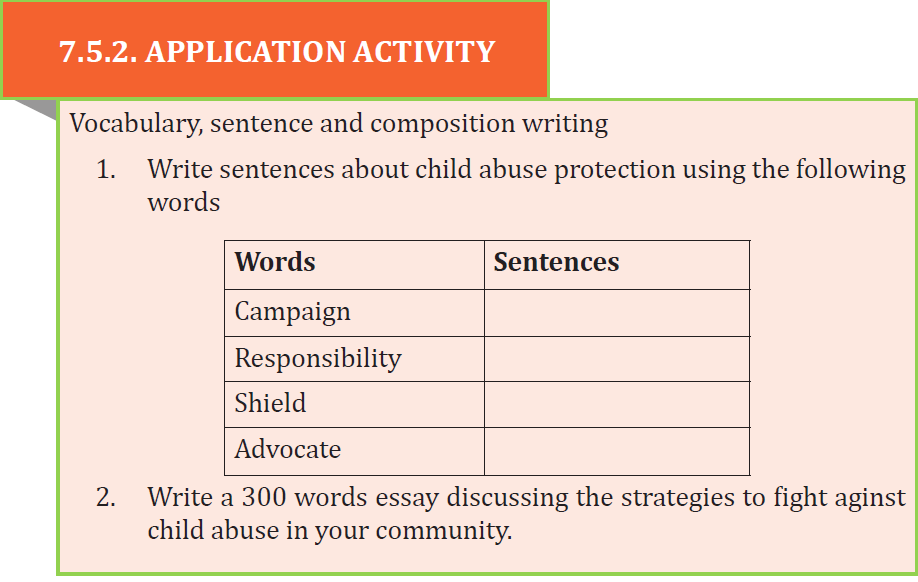
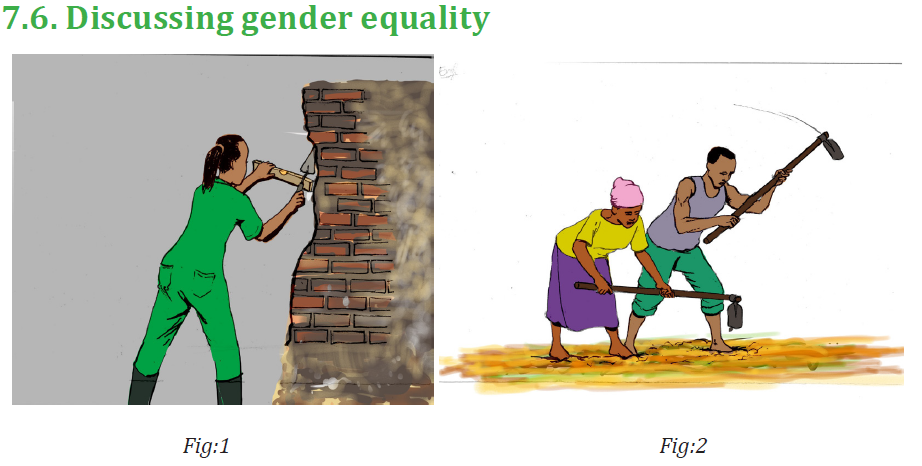 7.6.1. Learning activity: Reading and text analysisRead the above passage and answer questions that follow• Text. The Convention on the Elimination of all forms of DiscriminationAgainst Women (CEDAW)This was adopted in 1979 by the UN. It aims at eliminating any form of political,economic, social, cultural and civil discrimination against women. States arerequired to enshrine gender equality into their national laws and eliminatecustoms that promote superiority of one sex or gender role stereotypes. Inaddition, states should establish tribunals and public institutions to protectwomen against discrimination.Article 1 of the treaty defines discrimination against women as any distinction,exclusion or restriction made on the basis of sex which has the effector purpose of impairing or nullifying the recognition, enjoyment orexercise by women, irrespective of their marital status, on a basisof equality of men and women, of human rights and fundamentalfreedoms in the political, economic, social, cultural, civil or any otherfield.Article 2 requires states to enshrine gender equality into their nationallaws and remove all discriminatory provisions in their laws. Italso requires them to establish tribunals and public institutions toguarantee women of effective protection against discrimination andeliminate all forms of discrimination against women by individuals,organizations and enterprises.Article 3 stipulates that States Parties shall take in all fields, in particular inthe political, social, economic and cultural fields, all appropriatemeasures, including legislation, to ensure the full development andadvancement of women, for the purpose of guaranteeing them theexercise and enjoyment of human rights and fundamental freedomson a basis of equality with men.Article 4 Specifies that adoption by States Parties of temporary specialmeasures aimed at accelerating de facto equality between menand women shall not be considered discrimination as defined inthe present convention, but shall in no way entail as a consequencethe maintenance of unequal or separate standards; these measuresshall be discontinued when the objectives of equality of opportunityand treatment have been achieved.This article also instructs that adoption by States Parties of specialmeasures, including those measures contained in the presentConvention, aimed at protecting maternity shall not be considereddiscriminatory.Article 5 requires states to eliminate prejudices and customs that promote theidea of the inferiority or the superiority of one sex or stereotypedroles for men and women.Adapted from General Studies and Communication Skills for Rwandan schoolsStudent Book S6(REB).• Comprehension questions:1. When was that convention on the elimination of all forms of discriminationagainst women adopted?2. What did this convention require the government?3. What do you understand by ‘discrimination against women’?4. Discuss some prejudices attributed to women.5. Does this convention apply in your community? Support your answer.
7.6.1. Learning activity: Reading and text analysisRead the above passage and answer questions that follow• Text. The Convention on the Elimination of all forms of DiscriminationAgainst Women (CEDAW)This was adopted in 1979 by the UN. It aims at eliminating any form of political,economic, social, cultural and civil discrimination against women. States arerequired to enshrine gender equality into their national laws and eliminatecustoms that promote superiority of one sex or gender role stereotypes. Inaddition, states should establish tribunals and public institutions to protectwomen against discrimination.Article 1 of the treaty defines discrimination against women as any distinction,exclusion or restriction made on the basis of sex which has the effector purpose of impairing or nullifying the recognition, enjoyment orexercise by women, irrespective of their marital status, on a basisof equality of men and women, of human rights and fundamentalfreedoms in the political, economic, social, cultural, civil or any otherfield.Article 2 requires states to enshrine gender equality into their nationallaws and remove all discriminatory provisions in their laws. Italso requires them to establish tribunals and public institutions toguarantee women of effective protection against discrimination andeliminate all forms of discrimination against women by individuals,organizations and enterprises.Article 3 stipulates that States Parties shall take in all fields, in particular inthe political, social, economic and cultural fields, all appropriatemeasures, including legislation, to ensure the full development andadvancement of women, for the purpose of guaranteeing them theexercise and enjoyment of human rights and fundamental freedomson a basis of equality with men.Article 4 Specifies that adoption by States Parties of temporary specialmeasures aimed at accelerating de facto equality between menand women shall not be considered discrimination as defined inthe present convention, but shall in no way entail as a consequencethe maintenance of unequal or separate standards; these measuresshall be discontinued when the objectives of equality of opportunityand treatment have been achieved.This article also instructs that adoption by States Parties of specialmeasures, including those measures contained in the presentConvention, aimed at protecting maternity shall not be considereddiscriminatory.Article 5 requires states to eliminate prejudices and customs that promote theidea of the inferiority or the superiority of one sex or stereotypedroles for men and women.Adapted from General Studies and Communication Skills for Rwandan schoolsStudent Book S6(REB).• Comprehension questions:1. When was that convention on the elimination of all forms of discriminationagainst women adopted?2. What did this convention require the government?3. What do you understand by ‘discrimination against women’?4. Discuss some prejudices attributed to women.5. Does this convention apply in your community? Support your answer.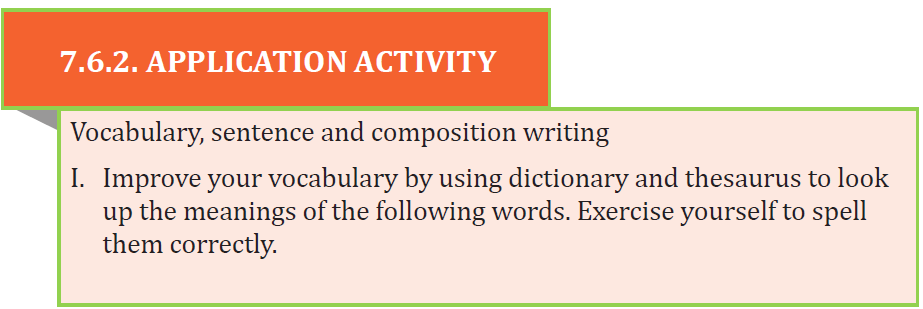
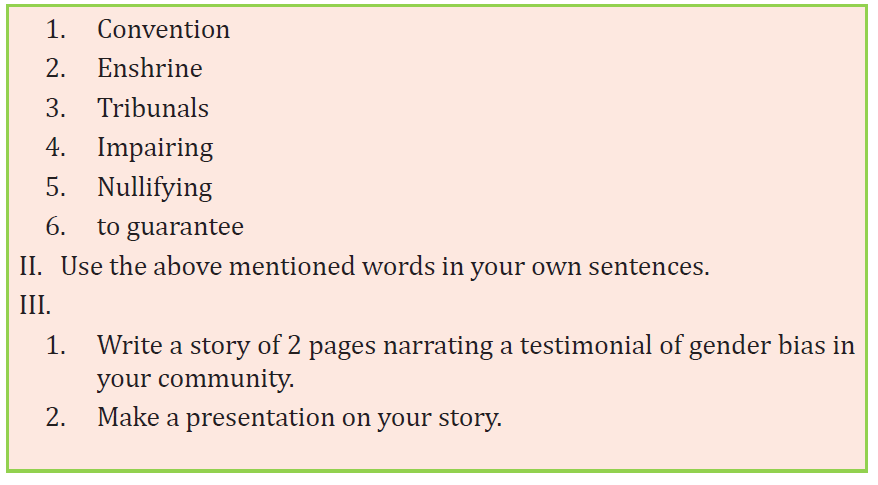 7.7. Minority rights and inclusiveness
7.7. Minority rights and inclusiveness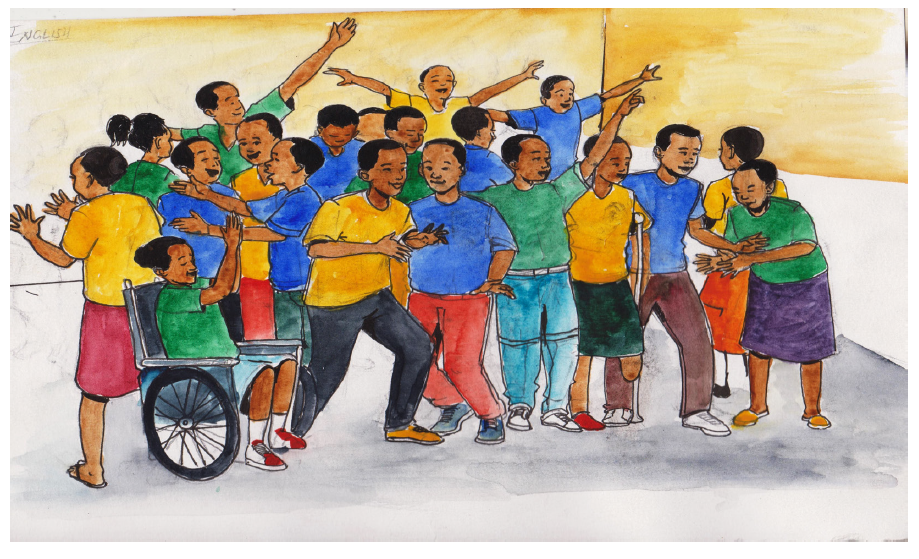 7.7.1. LEARNING ACTIVITYReading and text analysis.• Text: From hyperactive to stardomKalisa is a 13 young boy and was born in rural village. In his daily activities hehad inattention to accomplish tasks and was not able to follow some instructionsbecause of his hyperactivities. His parents had tried to take him to the nearestschool in order to help him like other children but his condition did not becomegood for the classmates. In class, other students were not happy with him, dueto the way he interrupted them during activities by talking, throwing things,among others.During break time, he could not be calm, he was always running, jumping anddriving vehicles. Even though he was overactive, he was also interested inplaying music with piano or guitar and singing. His teacher has discovered thatKalisa may be good at music and then oriented him to a new teacher who couldhelp him. Thanks to the help of that teacher, Kalisa has become good at playingsome musical instruments.The teacher advised parents to take him to the specialist. When Kalisa arrivedthere he was diagnosed with ADHD (Attention Deficit Hyperactive disorder).In three years later he was able to play piano and sing some songs. His parentswere happy because of their child’s success and they promised to support himto make the album of his songs.about-adhd/• Comprehension questions1. What do you understand by ADHD2. Why do you think the first teacher took Kalisa to the second teacher?3. Can really children with ADHD study in the same class with other children(with or without) disabilities? Explain why?4. Is there any strategy to educate children with ADHD? Explain.7.7.2. APPLICATION ACTIVITY
7.7.1. LEARNING ACTIVITYReading and text analysis.• Text: From hyperactive to stardomKalisa is a 13 young boy and was born in rural village. In his daily activities hehad inattention to accomplish tasks and was not able to follow some instructionsbecause of his hyperactivities. His parents had tried to take him to the nearestschool in order to help him like other children but his condition did not becomegood for the classmates. In class, other students were not happy with him, dueto the way he interrupted them during activities by talking, throwing things,among others.During break time, he could not be calm, he was always running, jumping anddriving vehicles. Even though he was overactive, he was also interested inplaying music with piano or guitar and singing. His teacher has discovered thatKalisa may be good at music and then oriented him to a new teacher who couldhelp him. Thanks to the help of that teacher, Kalisa has become good at playingsome musical instruments.The teacher advised parents to take him to the specialist. When Kalisa arrivedthere he was diagnosed with ADHD (Attention Deficit Hyperactive disorder).In three years later he was able to play piano and sing some songs. His parentswere happy because of their child’s success and they promised to support himto make the album of his songs.about-adhd/• Comprehension questions1. What do you understand by ADHD2. Why do you think the first teacher took Kalisa to the second teacher?3. Can really children with ADHD study in the same class with other children(with or without) disabilities? Explain why?4. Is there any strategy to educate children with ADHD? Explain.7.7.2. APPLICATION ACTIVITY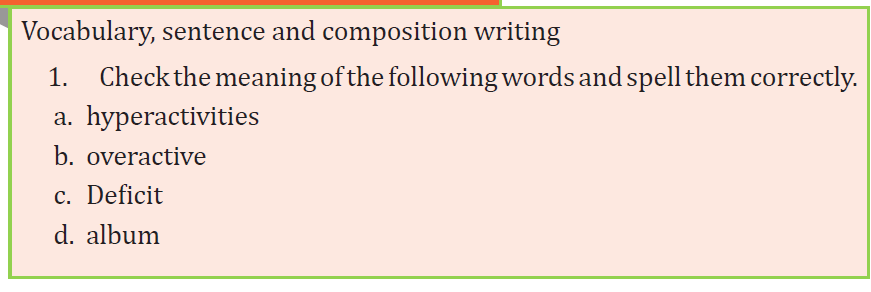
 7.8. Language structure: Modal Verbs and passive voice inpresent tenseI. Modal verbsDefinitionA Modal Verb is a type of auxiliary (helping) verb that is used to convey ideaslike talking about ability, asking permission, making requests, talking aboutthings which are desired and so on.How to use the Modal Verb “Can”.Can is used when talking about someone’s skill or general abilities. It is alsoused tomake offers, ask and give permission.Examples:1. Rodgers is patient and humble, he can adapt to any situation. (Ability)2. If children’s rights are recognized, a child can follow a career he likes.(Permission)3. I can play for you a nice piece of music about children’s rights if you like.(Offer)How to use modal verb shouldShould is used when giving a piece of advice, a recommendation or a suggestion.Very often, should is used instead of Must to make rules, orders or instructionssound more polite.Examples:a. If we are to live peacefully with others, we should avoid prejudices.(Advice, recommendation, suggestion).b. We should experience a united community since people now respect eachother’s beliefs. (Likely situation).c. As tolerance is encouraged in our communities, we should have a morepeaceful generation in the future. (Prediction).How to use may and mightMight is used to talk about possibilities in the present, past and future. It hasthe same meaning as may but may is used when one is a bit more sure, whilemight expresses some doubts. Therefore, may” and “might” can be used:a. To show possibilityExamples1. There might be life on Mars, we never know. (In this sentence, the degreeof certainty is low)2. There may be life on Mars since they found there water and microorganisms. (In this sentence, the degree of certainty is a bit higher forwater and micro organisms are signs of life)b. To ask for or give permission:ExamplesYou may go now.You may come at eleven if you wish.c. To express polite offers, request or suggestions.Examples:1. May I borrow the car tomorrow?2. May we come a bit later?How to use be able toWe use was/ were able to, or managed to, to describe successful completion ofa specific action while am/ is/ are able to, to express ability to do somethingnow.Examples1. ANC was able to fight against apartheid in South Africa.2. Even though I am a woman, I am able to driveExerciseConstruct nine meaningful sentences related to human rights and ethicsusing each of the following model verbs: can, may and should. Then read yoursentences to the class.II. Passive voice for present tenseThe passive voice is used mostly in three ways:1. When we don’t want to take responsibility for something.E.g. children’s rights are not respected in some countries2. When we want to focus on what happened but not the one who did the action.E.g. the laws of protecting a woman are broken every day. (We don’t know by who)3. When we want to avoid subjects which would make the meaningconfusing.E.g. child abuse was talked about in the meeting.Note: we use “by” when we want to say who did the action with action verbs.Exercise: transform the following sentences into passive voice1. Waitress and waiters serve customers.2. The teacher is going to explain the lesson.3. Does Professor Samuel teach that course?4. Tell the class 10 things a child should be provided with because it is his/her right. Remember to use passive voice. ( example: a child should begiven food)7.4. End unit assessmentEND UNIT ASSESSMENT
7.8. Language structure: Modal Verbs and passive voice inpresent tenseI. Modal verbsDefinitionA Modal Verb is a type of auxiliary (helping) verb that is used to convey ideaslike talking about ability, asking permission, making requests, talking aboutthings which are desired and so on.How to use the Modal Verb “Can”.Can is used when talking about someone’s skill or general abilities. It is alsoused tomake offers, ask and give permission.Examples:1. Rodgers is patient and humble, he can adapt to any situation. (Ability)2. If children’s rights are recognized, a child can follow a career he likes.(Permission)3. I can play for you a nice piece of music about children’s rights if you like.(Offer)How to use modal verb shouldShould is used when giving a piece of advice, a recommendation or a suggestion.Very often, should is used instead of Must to make rules, orders or instructionssound more polite.Examples:a. If we are to live peacefully with others, we should avoid prejudices.(Advice, recommendation, suggestion).b. We should experience a united community since people now respect eachother’s beliefs. (Likely situation).c. As tolerance is encouraged in our communities, we should have a morepeaceful generation in the future. (Prediction).How to use may and mightMight is used to talk about possibilities in the present, past and future. It hasthe same meaning as may but may is used when one is a bit more sure, whilemight expresses some doubts. Therefore, may” and “might” can be used:a. To show possibilityExamples1. There might be life on Mars, we never know. (In this sentence, the degreeof certainty is low)2. There may be life on Mars since they found there water and microorganisms. (In this sentence, the degree of certainty is a bit higher forwater and micro organisms are signs of life)b. To ask for or give permission:ExamplesYou may go now.You may come at eleven if you wish.c. To express polite offers, request or suggestions.Examples:1. May I borrow the car tomorrow?2. May we come a bit later?How to use be able toWe use was/ were able to, or managed to, to describe successful completion ofa specific action while am/ is/ are able to, to express ability to do somethingnow.Examples1. ANC was able to fight against apartheid in South Africa.2. Even though I am a woman, I am able to driveExerciseConstruct nine meaningful sentences related to human rights and ethicsusing each of the following model verbs: can, may and should. Then read yoursentences to the class.II. Passive voice for present tenseThe passive voice is used mostly in three ways:1. When we don’t want to take responsibility for something.E.g. children’s rights are not respected in some countries2. When we want to focus on what happened but not the one who did the action.E.g. the laws of protecting a woman are broken every day. (We don’t know by who)3. When we want to avoid subjects which would make the meaningconfusing.E.g. child abuse was talked about in the meeting.Note: we use “by” when we want to say who did the action with action verbs.Exercise: transform the following sentences into passive voice1. Waitress and waiters serve customers.2. The teacher is going to explain the lesson.3. Does Professor Samuel teach that course?4. Tell the class 10 things a child should be provided with because it is his/her right. Remember to use passive voice. ( example: a child should begiven food)7.4. End unit assessmentEND UNIT ASSESSMENT